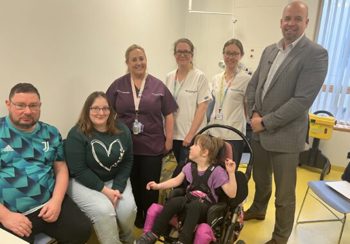Alder Hey first in the world to perform Deep Brain Stimulation using pioneering new technology
Wednesday, 17 April 2024

Alder Hey Children's Hospital has recently performed Deep Brain Stimulation (DBS) using a new advanced device to help treat dystonia. This is the first time in the world this new technology has been used on a child and is an advancement on previous devices used for this procedure.
The DBS procedure was carried out on 16th January 2024 and took four hours. It was performed on eight year old Hayley from Nantwich who was born with dystonic cerebral palsy. The surgical team was led by Alder Hey’s Consultant Neurosurgeon Mr Jonathan Ellenbogen and his team which included specialist surgeons, an anaesthetist, scrub nurses, operating room nurses and surgical technicians.
Dystonia is a life-long neurological condition that can cause uncontrolled and sometimes painful muscle cramps and spasms. This can really impact a child’s quality of life, making daily tasks more painful and difficult.
Mr Ellenbogen and his team used new BrainSense technology that has been developed by Medtronic. They inserted insulated electrodes into a very specific location in the brain responsible for movement control which can be as small as a grain of rice.
These brain electrodes are then connected by a wire under the skin through to a pulse generator device / battery which is implanted in the upper chest area or the abdomen. The battery is very similar to a pacemaker in that it uses electrical pulses to modify the signals causing the symptoms of dystonia. As a result, involuntary movements/spasms and pain caused by dystonia can be reduced.
Eight year old Hayley is the first patient to have undertaken the procedure with this new device. Hayley has dystonic cerebral palsy, and is non-verbal, which means that she has involuntary movements that affect her whole body. The procedure should help Hayley control her movements better.
Hayley’s dad Gareth said:
“If you think of a person as a light, if you turn the light on, it stays on until you switch it off, whereas Hayley’s condition means she ‘flickers’. It can be really frustrating as Hayley can’t tell us what she wants or needs although we know she loves being tickled as she laughs and smiles. We’re hoping this operation will help control her movement more and we get more of those amazing smiles.”
Mum Emma said “We think of the BrainSense tech as a dimmer that we can set to the perfect setting for Hayley. We’re excited about what could be.”
Consultant Neurosurgeon at Alder Hey, Mr Jonathan Ellenbogen said:
“The new BrainSense technology captures brain activity data direct from the leads implanted into the patient’s brain. This helps us to accurately detect and analyse the brain signals that are causing the dystonia. We can access this data and adjust the deep brain stimulation (DBS) settings — personalising the therapy for the best possible outcome. This is a huge step forward and something we couldn’t do before. This is also particularly important in patients who are non-verbal. It also has other benefits including the smallest battery available (which makes it suitable for children, as well as adults) which is rechargeable.
“DBS isn’t suitable for all patients with dystonia, but for some children and young people it can be life-changing. The device is switched on a couple of weeks after the procedure and although results aren’t instantaneous, we should be able to see improvements within a few months and we’re hoping that Hayley will have a much better quality of life as a result.”
Hayley and her family spent a few days in Alder Hey recovering from the procedure before going back home to Nantwich.